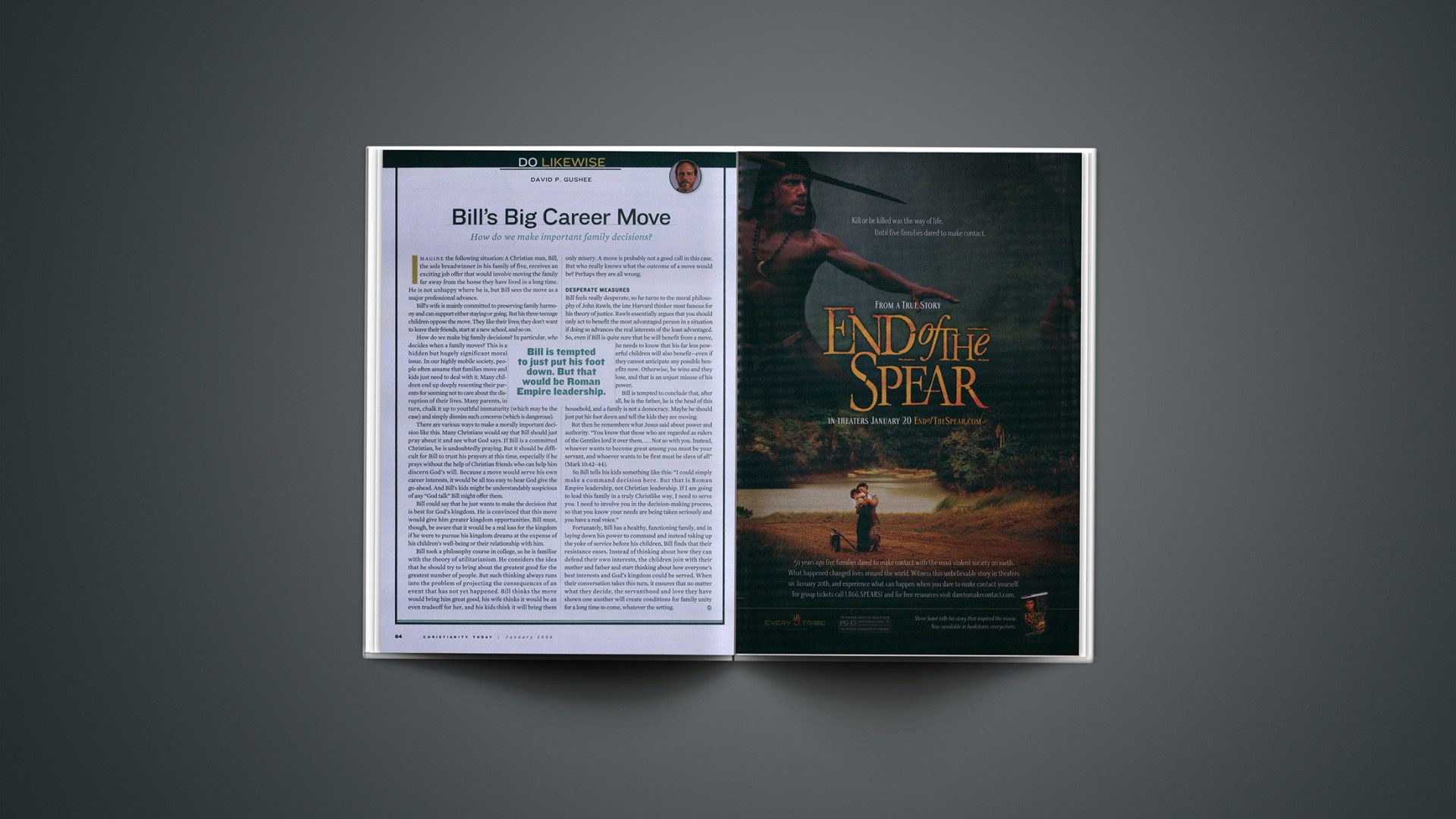Imagine the following situation: A Christian man, Bill, the sole breadwinner in his family of five, receives an exciting job offer that would involve moving the family far away from the home they have lived in a long time. He is not unhappy where he is, but Bill sees the move as a major professional advance.
Bill’s wife is mainly committed to preserving family harmony and can support either staying or going. But his three teenage children oppose the move. They like their lives; they don’t want to leave their friends, start at a new school, and so on.
How do we make big family decisions? In particular, who decides when a family moves? This is a hidden but hugely significant moral issue. In our highly mobile society, people often assume that families move and kids just need to deal with it. Many children end up deeply resenting their parents for seeming not to care about the disruption of their lives. Many parents, in turn, chalk it up to youthful immaturity (which may be the case) and simply dismiss such concerns (which is dangerous).
There are various ways to make a morally important decision like this. Many Christians would say that Bill should just pray about it and see what God says. If Bill is a committed Christian, he is undoubtedly praying. But it should be difficult for Bill to trust his prayers at this time, especially if he prays without the help of Christian friends who can help him discern God’s will. Because a move would serve his own career interests, it would be all too easy to hear God give the go-ahead. And Bill’s kids might be understandably suspicious of any “God talk” Bill might offer them.
Bill could say that he just wants to make the decision that is best for God’s kingdom. He is convinced that this move would give him greater kingdom opportunities. Bill must, though, be aware that it would be a real loss for the kingdom if he were to pursue his kingdom dreams at the expense of his children’s well-being or their relationship with him.
Bill took a philosophy course in college, so he is familiar with the theory of utilitarianism. He considers the idea that he should try to bring about the greatest good for the greatest number of people. But such thinking always runs into the problem of projecting the consequences of an event that has not yet happened. Bill thinks the move would bring him great good, his wife thinks it would be an even tradeoff for her, and his kids think it will bring them only misery. A move is probably not a good call in this case. But who really knows what the outcome of a move would be? Perhaps they are all wrong.
Desperate Measures
Bill feels really desperate, so he turns to the moral philosophy of John Rawls, the late Harvard thinker most famous for his theory of justice. Rawls essentially argues that you should only act to benefit the most advantaged person in a situation if doing so advances the real interests of the least advantaged. So, even if Bill is quite sure that he will benefit from a move, he needs to know that his far less powerful children will also benefit-even if they cannot anticipate any possible benefits now. Otherwise, he wins and they lose, and that is an unjust misuse of his power.
Bill is tempted to conclude that, after all, he is the father, he is the head of this household, and a family is not a democracy. Maybe he should just put his foot down and tell the kids they are moving.
But then he remembers what Jesus said about power and authority. “You know that those who are regarded as rulers of the Gentiles lord it over them. … Not so with you. Instead, whoever wants to become great among you must be your servant, and whoever wants to be first must be slave of all” (Mark 10:42-44).
So Bill tells his kids something like this: “I could simply make a command decision here. But that is Roman Empire leadership, not Christian leadership. If I am going to lead this family in a truly Christlike way, I need to serve you. I need to involve you in the decision-making process, so that you know your needs are being taken seriously and you have a real voice.”
Fortunately, Bill has a healthy, functioning family, and in laying down his power to command and instead taking up the yoke of service before his children, Bill finds that their resistance eases. Instead of thinking about how they can defend their own interests, the children join with their mother and father and start thinking about how everyone’s best interests and God’s kingdom could be served. When their conversation takes this turn, it ensures that no matter what they decide, the servanthood and love they have shown one another will create conditions for family unity for a long time to come, whatever the setting.
Copyright © 2006 Christianity Today. Click for reprint information.
Related Elsewhere:
David P. Gushee is Graves Professor of Moral Philosophy at Union University. His books include Only Human: Christian Reflections on the Journey Toward Wholeness, Getting Marriage Right, and he is coauthor of Kingdom Ethics Following Jesus in a Contemporary Context. His columns for Christianity Today include:
Our Missing Moral Compass | Christianity is more than an event, an experience, or a set of beliefs. (Nov. 14, 2005)










